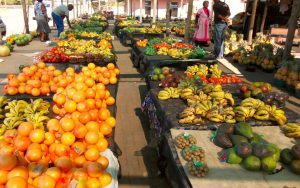Time: 10:30 - 12:30
Venue: Zoom

Photo R. du Plessis/Unsplash.

The COVID-19 pandemic, floods and droughts, the Russia-Ukraine conflict, and civil unrest have all negatively impacted the South African food system and left South Africans in an even deeper state of food insecurity.
The crises have disrupted food value chains, severely impacting the distribution of food. Many vulnerable households became more food insecure as disruptions reduced food availability and accessibility. Food-related livelihoods across the food system — from production via processing, distribution to retail — were compromised.
The multiple shocks and stressors have emphasised the need to act urgently to instil resilience and equity within the South African food system so it is better able to withstand future crises. Shocks and stressors rarely happen in isolation, always impacting the wider food system. Learning from and adapting to crises is crucial to achieving food security, protecting livelihoods and ensuring environmental sustainability.
In light of this, in 2022, the Food and Agriculture Organization of the United Nations (FAO) commissioned ICLEI Africa to conduct a study to offer insight into these disruptions and inform the development of inclusive, resilient and sustainable food systems. Whilst the focus will be rebuilding two provincial economies, those of KwaZulu-Natal and Gauteng, the project will inform food systems resilience planning on a national level.
The project provides an in-depth understanding of the challenges experienced by vulnerable groups, and how disruptions in the South African food system exacerbate existing challenges. A draft strategic framework to guide policy interventions towards a resilient, equitable and sustainable food system is now up for review. ICLEI Africa has partnered with the CoE-FS’s Food Imbizo to offer a platform for an inclusive review of the framework.
You are invited to an interactive workshop to discuss the draft strategy, identify any gaps it may have and provide recommendations to strengthen it.
Date: Monday, 13 February 2023
Time: 10:30-12:30
Place: Online Zoom meeting
Upcoming Events
Our GOALS
We recognise that producers, processors, distributors and consumers are incorporated into the food system under varying terms and returns. We also recognise the economic, social, human and environmental health impacts associated with food security. Therefore our goal is to conduct research, build capacity and disseminate findings that will promote a sustainable food system in South Africa.
Our MISSION
Our research is concerned with the scale, nature, causes and consequences of food insecurity in South Africa and elsewhere on the African continent. Thus our mission is to investigate products, technologies, processes and policies that can reduce food insecurity and mitigate its negative outcomes. We seek to make a difference to food security by linking innovative science with critical enquiry.



